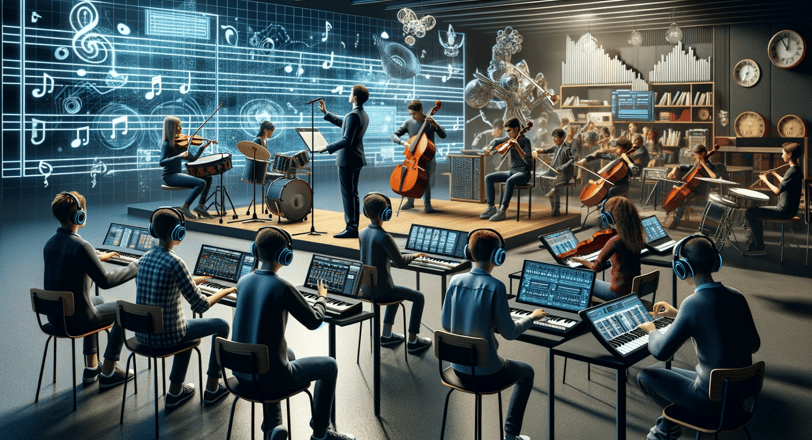Adapting to Technology and a Changing Landscape
The Future of Music Education
5/2/20243 min read


A Human Touch: The Enduring Role of the Teacher in a Tech-Driven Future
While technology offers incredible tools, music education thrives on human interaction and mentorship. Here's why music teachers remain irreplaceable:
Mentorship and Guidance: A skilled music teacher provides invaluable mentorship, nurturing a love for music and fostering a student's individual talent. Teachers can identify potential, provide constructive feedback, and guide students in developing their musical skills and artistry. This one-on-one guidance is crucial for a student's musical growth.
Social and Emotional Learning: Music education goes beyond notes and techniques. It fosters collaboration, teamwork, communication skills, and emotional expression. Teachers create a positive learning environment where students can build confidence, develop a growth mindset, and learn to work together towards a common goal. These social and emotional skills are crucial for success in all areas of life.
Critical Thinking and Problem-Solving: Learning music requires critical thinking, problem-solving, and perseverance. Teachers can guide students in overcoming challenges, analyzing complex musical concepts, and developing a growth mindset that encourages them to keep striving for improvement. This fosters valuable skills that benefit students in all their academic endeavors.
The Future Symphony: A Harmonious Blend of Technology and Human Expertise
The future of music education is not about replacing teachers with technology. It's about creating a beautiful harmony between innovative tools and the irreplaceable role of human expertise. By embracing technology while valuing the importance of mentorship and social interaction, we can ensure music education continues to inspire, empower, and equip future generations with the skills and passion for a lifelong love of music.
Stay in Tune with the Future of Music Education!
The landscape of music education is constantly evolving. Sign up for our FREE weekly music education newsletter to stay informed about the latest trends, teaching strategies, and technological advancements! We'll provide you with a treasure trove of resources to enhance your teaching journey.
Sign up below and get your FREE Ebook " From Pen to DAW: Mastering Music Composition in the Digital Age"
The melody of music education has always held a special place in our lives, fostering creativity, discipline, and a lifelong love for the arts. But the traditional classroom setting, with its focus on sheet music and acoustic instruments, is evolving. Technology is transforming the way we create and consume music, and music educators need to adapt to ensure music education remains vibrant and relevant for future generations. Let's delve deeper into some key trends shaping the future of music education.
Tech Integration: A Symphony of Powerful Tools
Technology offers a wealth of tools that can enhance and personalize music education, moving beyond the limitations of traditional methods:
Digital Audio Workstations (DAWs): Imagine a classroom where students are no longer restricted to acoustic instruments. DAWs empower students to create and record their own music electronically, fostering creativity and experimentation. These powerful software programs provide students with a virtual arsenal of instruments, loops, samples, and effects, allowing them to compose original pieces and explore different genres.
Interactive Learning Platforms: Gone are the days of rote memorization and paper drills. Online platforms offer engaging exercises, games, and tutorials that cater to different learning styles. These tools can gamify music theory concepts, ear training exercises, and rhythm practice, making learning music theory fun and interactive. Imagine students tackling music theory challenges through engaging games or honing their ear training skills with interactive exercises that provide immediate feedback.
Virtual Reality (VR) and Augmented Reality (AR): These emerging technologies have the potential to create immersive and interactive learning experiences that can revolutionize music education. Imagine VR simulations that transport students into a virtual concert hall, allowing them to experience the acoustics and atmosphere of a live performance firsthand. Or, consider AR applications that display interactive sheet music overlaid on instruments, offering real-time feedback and guidance.
Beyond the Classroom Walls: Expanding Accessibility and Breaking Barriers
Technology dismantles geographical and socioeconomic barriers, making high-quality music education more accessible than ever before:
Online Learning Platforms: Imagine a student in a remote village gaining access to masterclasses led by renowned musicians from around the world. Online courses and video tutorials allow students to learn at their own pace from the comfort of their homes, regardless of location. This opens doors to a global network of educators and fosters a wider range of musical influences.
Collaborative Learning Tools: The internet fosters connection and collaboration. Online platforms can connect students from different regions and backgrounds, allowing them to work together on musical projects, share ideas, and learn from each other. This fosters a sense of global community and cultural exchange, enriching the learning experience.
Personalized Learning Programs: Artificial intelligence has the potential to personalize learning experiences to individual student needs and learning styles. Imagine an adaptive learning program that assesses a student's strengths and weaknesses, then suggests personalized exercises and adjusts difficulty levels based on their progress. This ensures students are challenged appropriately and can progress at their own pace.
